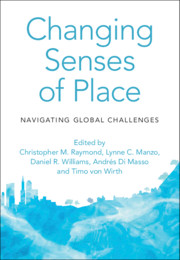Book contents
- Changing Senses of Place
- Changing Senses of Place
- Copyright page
- Dedication
- Contents
- Contributors
- Foreword
- Preface
- Acknowledgements
- Introduction
- Part I Climate Change and Ecological Regime Shifts
- Part II Migration, Mobility and Belonging
- 6 Exploring Senses of Place Through Narratives of Tourism Growth and Place Change
- 7 No One Is a Prophet at Home
- 8 Place Detachment and the Psychology of Nonbelonging
- 9 Sense of Place in Urban China
- Part III Renewable Energy Transitions
- Part IV Nationalism and Competing Territorial Claims
- Part V Urban Change
- Part VI Technological and Legal Transformations
- Part VII Design and Planning Strategies for Changing Senses of Place
- Part VIII Conclusion
- Index
- References
9 - Sense of Place in Urban China
Multiple Determinants of Rural–Urban Migrants’ Belongingness to the Host City
from Part II - Migration, Mobility and Belonging
Published online by Cambridge University Press: 15 July 2021
- Changing Senses of Place
- Changing Senses of Place
- Copyright page
- Dedication
- Contents
- Contributors
- Foreword
- Preface
- Acknowledgements
- Introduction
- Part I Climate Change and Ecological Regime Shifts
- Part II Migration, Mobility and Belonging
- 6 Exploring Senses of Place Through Narratives of Tourism Growth and Place Change
- 7 No One Is a Prophet at Home
- 8 Place Detachment and the Psychology of Nonbelonging
- 9 Sense of Place in Urban China
- Part III Renewable Energy Transitions
- Part IV Nationalism and Competing Territorial Claims
- Part V Urban Change
- Part VI Technological and Legal Transformations
- Part VII Design and Planning Strategies for Changing Senses of Place
- Part VIII Conclusion
- Index
- References
Summary
Since the mid-1980s, China has experienced an unprecedented wave of internal migration from rural to urban areas. However, due to the lack of formal residential registration status (Hukou in Chinese), these rural–urban migrants have faced difficulties in re-establishing a sense of belonging to the host city. By using a nationwide survey (2013, n = 12,807) and multilevel logistic regressions, this study has found that, beyond social capital, institutional and financial support are most likely to help migrants adapt to their new lives. The Hukou reforms indeed are helping to construct their belonging to the host city. This study and its emphasis on place-related belonging enriches the meaning of sense of place, especially as it encourages a pluralistic concept. It attempts to understand place-related belonging as an embedded relationship between the individual and the local structure, a relationship that arises from the institutional, social and economic context.
- Type
- Chapter
- Information
- Changing Senses of PlaceNavigating Global Challenges, pp. 116 - 128Publisher: Cambridge University PressPrint publication year: 2021
References
- 1
- Cited by

